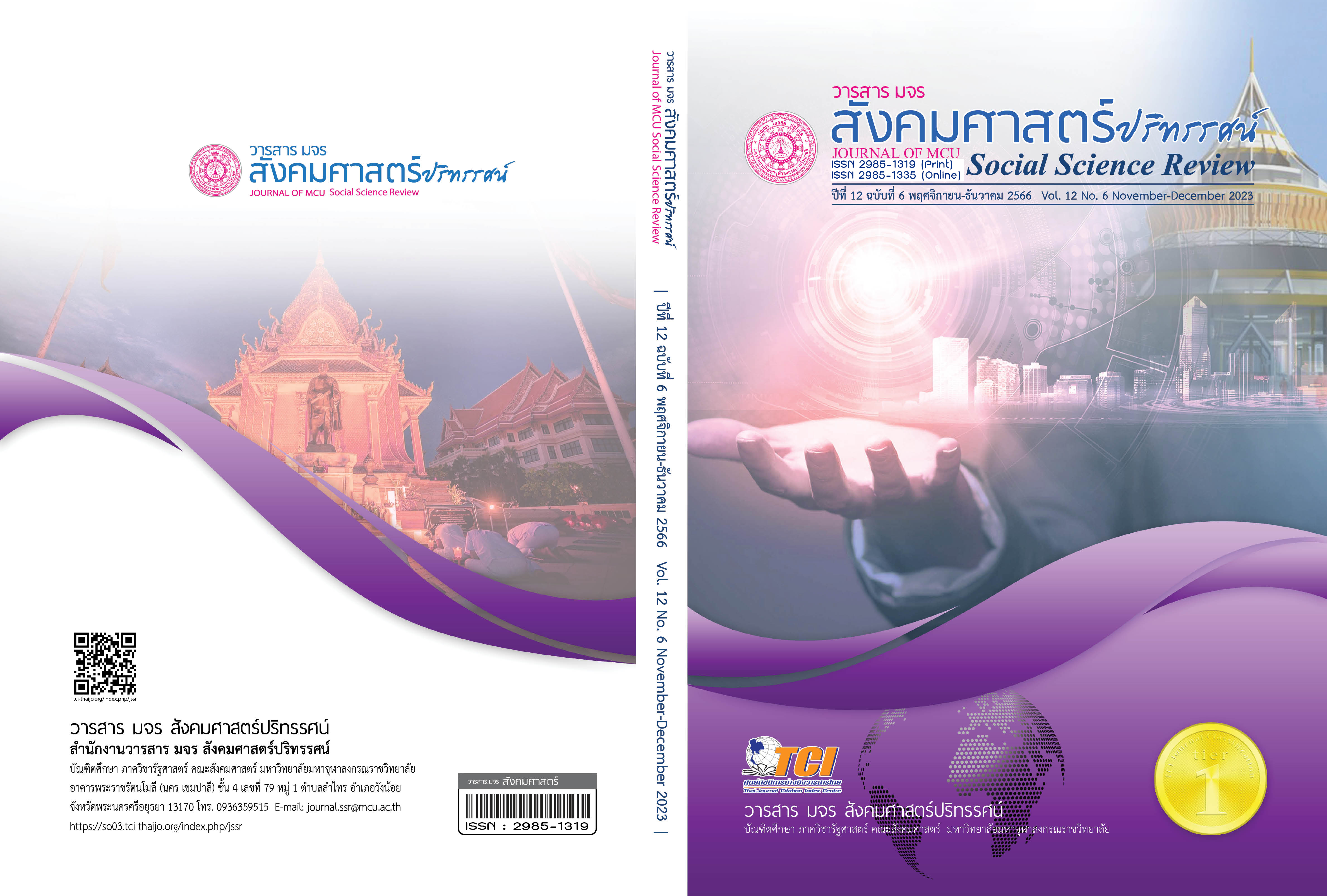ปัจจัยที่ส่งผลต่อประสิทธิผลการเรียนรู้ออนไลน์ของโรงเรียนเอกชน : กรณีศึกษา โรงเรียนเอกชนในภาคกลาง
คำสำคัญ:
ประสิทธิผล, การเรียนรู้ออนไลน์, โรงเรียนเอกชนบทคัดย่อ
บทความวิจัยนี้มีวัตถุประสงค์เพื่อ 1. ศึกษาระดับประสิทธิผลการเรียนรู้ออนไลน์ของโรงเรียนเอกชน กรณีศึกษาโรงเรียนเอกชนในภาคกลาง และ 2. ศึกษาปัจจัยที่ส่งผลต่อประสิทธิผลการเรียนรู้ออนไลน์ของโรงเรียนเอกชน กรณีศึกษาโรงเรียนเอกชนในภาคกลาง ประชากร ได้แก่ ครูและผู้ปกครองนักเรียนโรงเรียนเอกชนในภาคกลาง จำนวน 317,942 คนตัวอย่างที่ใช้ในการวิจัย จำนวน 762 คน สุ่มแบบแบ่งชั้นภูมิเป็นสัดส่วน เครื่องมือที่ใช้เป็นแบบสอบถามลักษณะมาตราส่วนประมาณค่า 5 ระดับมีความเชื่อมั่นเท่ากับ 0.97 การวิเคราะห์ข้อมูลใช้ค่าร้อยละ ค่าเฉลี่ย ค่าส่วนเบี่ยงเบนมาตรฐาน ค่าสัมประสิทธิ์สหสัมพันธ์เพียรสัน และการวิเคราะห์ถดถอยพหุคูณแบบขั้นตอน (Stepwise Multiple Regression)
ผลการศึกษาพบว่า 1. ประสิทธิผลการเรียนรู้ออนไลน์ของโรงเรียนเอกชน กรณีศึกษาโรงเรียนเอกชนในภาคกลาง โดยภาพรวมอยู่ในระดับมาก 2. ปัจจัยการได้รับการสนับสนุนทางสังคมของครู และปัจจัยพฤติกรรมการสอนออนไลน์ของครู ส่งผลโดยตรงต่อประสิทธิผลการเรียนรู้ออนไลน์ของโรงเรียนเอกชน ร่วมกันพยากรณ์ได้ร้อยละ 72 (R2 = .720) โดยสมการวิเคราะห์การถดถอย คือ ý = .083 + .585 (X4) + .398 (X5)
เอกสารอ้างอิง
ชิตวร ลีละผลิน. (2565). วิกฤตการศึกษาไทย ถ้าไร้การศึกษาเอกชน. สืบค้น 13 กุมภาพันธ์ 2565, จาก www.matichon.co.th/education/news_2507335
วรากร สามโกเศศ. (2564). เรียนออนไลน์ทำพิษ คณะกรรมการปฏิรูปการศึกษาเร่งจัดการสอนที่โรงเรียน. สืบค้น 1 ตุลาคม 2565, จาก https://www.prachachat.net /education/news-773403
ศุภเสฏฐ์ คณากูล. (2564). นักวิชาการ-ร.ร.เอกชน จี้ปรับรูปแบบ หลังพบเด็กลาออก-ออกกลางคันพุ่ง เปิดทาง น.ศ.หยุดเรียน-คืนค่าเทอม. สืบค้น 11 สิงหาคม2565, จาก https://www.matichon.co.th/education/news_2877911
สำนักงานคณะกรรมการการศึกษาขั้นพื้นฐาน. (2564). แนวทางการจัดการเรียนการสอนทางไกล ในสถานการณ์การแพร่ระบาดของโรคติดเชื้อไวรัสโคโรน่า 2019 (covid19). สืบค้น 2 ตุลาคม 2564, จาก http://www.ccs1.go.th/gis/eoffice/57000001tbl
สุชัชวีร์ สุวรรณสวัสดิ์. (2564). การศึกษาไทยเรียนแบบผสมผสานได้ผลสูงสุด. สืบค้น 5 ตุลาคม 2565, จาก https://www.thairath.co.th/news/local/2211052
Borup, J., et al. (2015). Parent and Student Perceptions of Parent Engagement at a Cyber Charter High School. Online Learning, 19(5), 69-91.
Krejcie, R. V., & Morgan, D. W. (1970). Determining sample size for research activities. Educational and psychological measurement, 30(3), 607-610.
Mishra, P. & Koehler, M.J. (2006). Technology pedagogical content knowledge: A framework for integrating technology in teacher knowledge. Teacher College Record, 108(6), 1017-1054.
Ng, J. et al. (2020). Non-repository Uses of Learning Management System through Mobile Access. Journal of Educational Technology Development and Exchange, 13(1), 1-11.
Nishan, F., & Mohamed, A. (2021). Emerging stronger: Policy directions for COVID-19 and beyond for public schools in the Maldives. Fulbright Review of Economics and Policy.
Novitasari, D. et al. (2021). The Influence of Social Support Factors on Performance: A Case Study of Elementary School Teachers. International Journal of Social and Management Studies, 2(1), 41-52.
UNESCO. (2021). Education: From disruption to recovery. Retrieved November 28, 2021, from https://en.unesco.org/covid19/educationresponse
ดาวน์โหลด
เผยแพร่แล้ว
รูปแบบการอ้างอิง
ฉบับ
ประเภทบทความ
สัญญาอนุญาต
ลิขสิทธิ์ (c) 2023 วารสาร มจร สังคมศาสตร์ปริทรรศน์

อนุญาตภายใต้เงื่อนไข Creative Commons Attribution-NonCommercial-NoDerivatives 4.0 International License.
เพื่อให้เป็นไปตามกฎหมายลิขสิทธิ์ ผู้นิพนธ์ทุกท่านต้องลงลายมือชื่อในแบบฟอร์มใบมอบลิขสิทธิ์บทความให้แก่วารสารฯ พร้อมกับบทความต้นฉบับที่ได้แก้ไขครั้งสุดท้าย นอกจากนี้ ผู้นิพนธ์ทุกท่านต้องยืนยันว่าบทความต้นฉบับที่ส่งมาตีพิมพ์นั้น ได้ส่งมาตีพิมพ์เฉพาะในวารสาร มจร สังคมศาสตร์ปริทรรศน์ เพียงแห่งเดียวเท่านั้น หากมีการใช้ภาพหรือตารางหรือเนื้อหาอื่นๆ ของผู้นิพนธ์อื่นที่ปรากฏในสิ่งตีพิมพ์อื่นมาแล้ว ผู้นิพนธ์ต้องขออนุญาตเจ้าของลิขสิทธิ์ก่อน พร้อมทั้งแสดงหนังสือที่ได้รับการยินยอมต่อบรรณาธิการ ก่อนที่บทความจะได้รับการตีพิมพ์ หากไม่เป็นไปตามข้อกำหนดเบื้องต้น ทางวารสารจะถอดบทความของท่านออกโดยไม่มีข้อยกเว้นใดๆ ทั้งสิ้น





